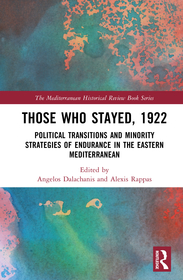
Those Who Stayed, 1922
Political Transitions and Minority Strategies of Endurance in the Eastern Mediterranean
Sorozatcím: The Mediterranean Historical Review Book Series;
-
20% KEDVEZMÉNY?
- A kedvezmény csak az 'Értesítés a kedvenc témákról' hírlevelünk címzettjeinek rendeléseire érvényes.
- Kiadói listaár GBP 145.00
-
69 273 Ft (65 975 Ft + 5% áfa)
Az ár azért becsült, mert a rendelés pillanatában nem lehet pontosan tudni, hogy a beérkezéskor milyen lesz a forint árfolyama az adott termék eredeti devizájához képest. Ha a forint romlana, kissé többet, ha javulna, kissé kevesebbet kell majd fizetnie.
- Kedvezmény(ek) 20% (cc. 13 855 Ft off)
- Kedvezményes ár 55 419 Ft (52 780 Ft + 5% áfa)
Iratkozzon fel most és részesüljön kedvezőbb árainkból!
Feliratkozom
69 273 Ft

Beszerezhetőség
Becsült beszerzési idő: A Prosperónál jelenleg nincsen raktáron, de a kiadónál igen. Beszerzés kb. 3-5 hét..
A Prosperónál jelenleg nincsen raktáron.
Why don't you give exact delivery time?
A beszerzés időigényét az eddigi tapasztalatokra alapozva adjuk meg. Azért becsült, mert a terméket külföldről hozzuk be, így a kiadó kiszolgálásának pillanatnyi gyorsaságától is függ. A megadottnál gyorsabb és lassabb szállítás is elképzelhető, de mindent megteszünk, hogy Ön a lehető leghamarabb jusson hozzá a termékhez.
A termék adatai:
- Kiadás sorszáma 1
- Kiadó Routledge
- Megjelenés dátuma 2025. szeptember 30.
- ISBN 9781032792200
- Kötéstípus Keménykötés
- Terjedelem236 oldal
- Méret 234x156 mm
- Súly 600 g
- Nyelv angol
- Illusztrációk 12 Illustrations, black & white; 12 Halftones, black & white 700
Kategóriák
Rövid leírás:
The volume uses diverse methodologies—archival research, network analysis, microhistory, and translocal perspectives – to investigate the lived experiences of entrenched minorities.
TöbbHosszú leírás:
The year 1922 marks a major turning point in Eastern Mediterranean history, with the abolition of the Ottoman Sultanate concluding a long period of upheaval known as the “Eastern Question.” As the empire gave way to European colonization and the nation-state model, its once multicultural societies were homogenized through violence, population transfers, and treaties. The liberal principle of national self-determination often led to devastating human costs, as populations were either massacred, forcibly exchanged, or reduced to “minorities” within new political entities.
While scholarship has thoroughly documented the demographic changes that accompanied the post-Ottoman transition, this volume focuses on a less explored dimension: the agency of those labeled as minorities. It examines how these communities navigated their new reality within emerging nation-states or League of Nations mandates. Adopting a broad and situational understanding of “minority,” it includes both legally defined groups and those marginalized in practice, such as Muslims in Western Thrace, Christians in Istanbul, Armenians in Jerusalem, Muslims in Serbia, and Jews in Salonica.
The volume uses diverse methodologies—archival research, network analysis, microhistory, and translocal perspectives – to investigate the lived experiences of entrenched minorities. It offers new insights into both lesser-known and familiar minority groups, while engaging critically with existing literature. By emphasizing these groups’ strategies and resilience, the volume challenges narratives dominated by violence and nostalgia, offering a more nuanced understanding of post-1922 Eastern Mediterranean history. It will appeal not only to scholars of minority studies but to anyone interested in the region’s modern past.
TöbbTartalomjegyzék:
Introduction: Minority Forms of Resilience in the Post-Ottoman World
Part 1: Shifting Grounds for Transient Minorities
Chapter 1
Civilising Mission or Reproduction of the Ottoman Governance? Minorities and Greek Imperial Formation in the Occupied Territories of Trabzon and Smyrna (1916-1922)
Lukas Tsıptsıos
Chapter 2
Catholic Entrenchment, Political Incertitude and Global Relief in Occupied Istanbul (1918-1923)
Gabrıel John Doyle
Part 2: Survival Beyond the State
Chapter 3
Entrenchment of the Armenian Genocide: Memorialisation by the Patriarchate of Jerusalem as Diasporic Identity Politics
Arman Khachatryan
Chapter 4
Enduring a Transition: Cretan Jews in Post-Ottoman Hania
Katerına Anagnostakı
Part 3: Resilience Within the Nation-State
Chapter 5
“Let’s Found the Jewish Secondary School This Year”: A Debate on Schooling and Language in Hellenising Salonika (1926-1928)
Defne Özözer
Chapter 6
The Kingdom of Yugoslavia and Minorities in South Serbia
Klara Volarıc
Chapter 7
Economic Nationalism and Non-Muslims in Early Republican Turkey: The Limitations of Exclusion
Semıh Gökatalay
Epilogue
Language of Politics, Politics of Language
Alexis Wıck
Több




